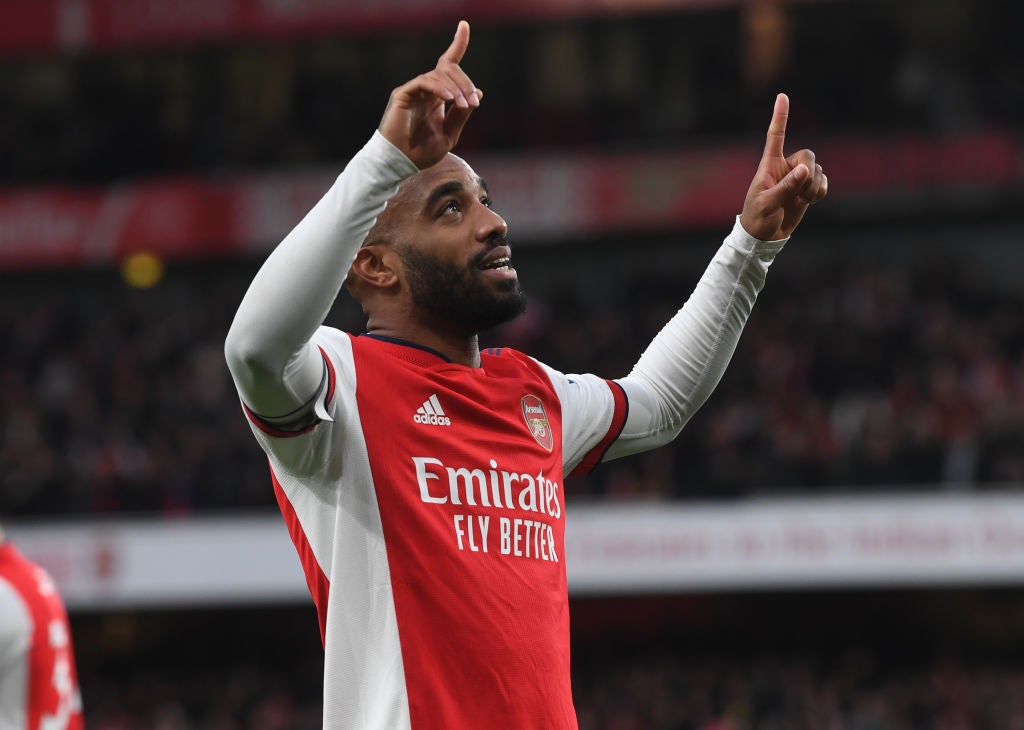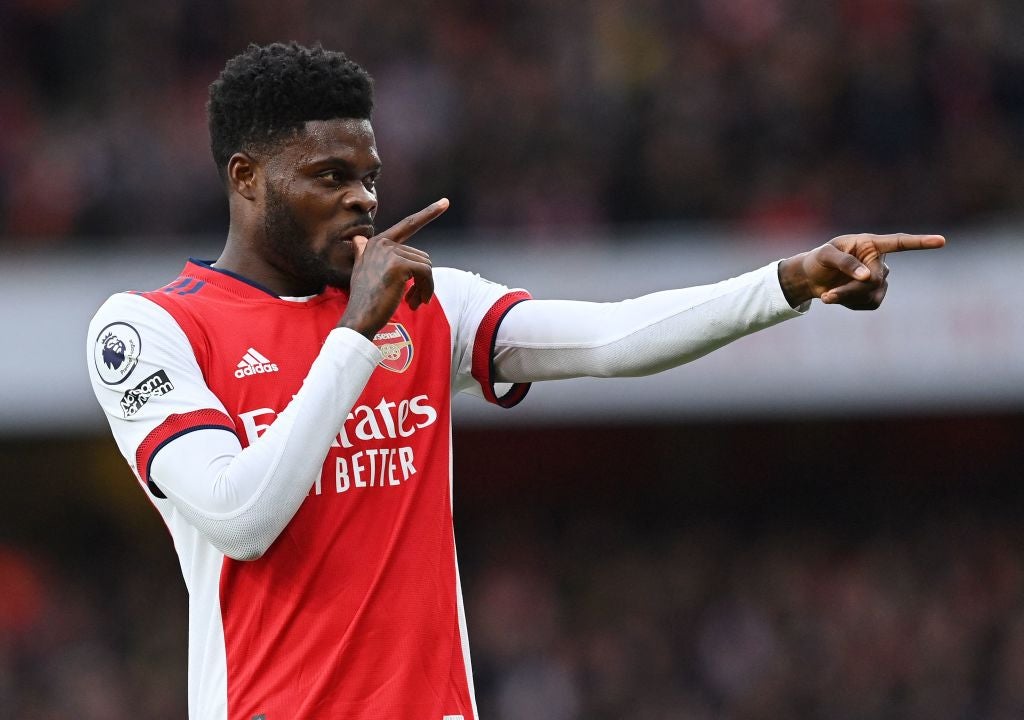Arsenal’s old guard come to the fore after season of starlets in the spotlight
Mikel Arteta’s young Gunners have earned the headlines for much of the campaign but the seniors are stepping up at the perfect time

Your support helps us to tell the story
From reproductive rights to climate change to Big Tech, The Independent is on the ground when the story is developing. Whether it's investigating the financials of Elon Musk's pro-Trump PAC or producing our latest documentary, 'The A Word', which shines a light on the American women fighting for reproductive rights, we know how important it is to parse out the facts from the messaging.
At such a critical moment in US history, we need reporters on the ground. Your donation allows us to keep sending journalists to speak to both sides of the story.
The Independent is trusted by Americans across the entire political spectrum. And unlike many other quality news outlets, we choose not to lock Americans out of our reporting and analysis with paywalls. We believe quality journalism should be available to everyone, paid for by those who can afford it.
Your support makes all the difference.Only in football, and maybe only at Arsenal right now, would the 2-0 victory at the Emirates Stadium against Leicester City be marked up as one for the oldies. For a team who boasts the youngest average age for a starting XI this season, 24 years and a bit, Sunday’s goalscorers of 28 and 30 years of age was noteworthy.
By the end of this straightforward victory which took them back up to fourth place, Arsenal’s top three goalscorers in the Premier League, all 21 or under, had taken to the field. The club’s lead marksman, Emile Smith Rowe (nine), came on as a substitute to check off a return to action after being struck down with Covid-19. Bukayo Saka (eight) and Gabriel Martinelli (five) garnered a lot of joy running at and through a midfield and defence ill-equipped to temper their speed of feet and thought.
However, it was Thomas Partey and Alexandre Lacazette who made the telling difference between the two sides. Not just with their header from a corner and composure from the spot, respectively. But as established players who for so long have been foils for these three musketeers.
Both were standouts beyond the scoresheet, and their performances speak of their own growth in a precocious squad.
Lacazette was able to wed his new penchant for dropping off with his old knack of barrelling in on goal. He was able to stretch and hold up against a deep defensive line, and might have bagged from open play in the first half had he not followed up some excellent off-the-ball movement with a duffed effort on a smart cut-back. The penalty – stuttering, clinical – was his first goal of the year after the winner against Wolves was attributed (correctly) to opposition goalkeeper Jose Sa.
Partey’s display in midfield, industrious with an extra edge of quality, was merely reconfirming an about-turn that saw him earn Arsenal’s player of the month award for February. He won every duel and tackle, recovered the ball four times and was able able to affect things further up the field. While Martin Odegaard put in a virtuoso performance with his wand of a left foot, the Ghanaian played the part of glamorous assistant: quick to relay passes when Leicester repelled Arsenal’s first attacks, which helped maintain pressure in the final third. He even showed a bit of subtlety with a strike off his instep that clip high on the outside of the post. The header at the near post, having started the corner routine on the other side of the box, was a well-executed bit of cat-and-mouse with his marker.
Partey may be the most noteworthy of these “elder statesmen”. Odegaard has long had his flowers: quickness of thought and feet so much more apparent for a player whose highbrow work comes in attack. For Partey, much of what he has done recently has only been respected by those in his immediate vicinity on the pitch. He was voted Arsenal’s player of the month for February and only halfway into March are we getting a general appreciation in the stands. An effort from outside the box that hit the post was a novelty given how poor his shooting has been since joining from Atletico Madrid.
But there was a very clear understanding from those at the Emirates that he has worked on being a better attacking threat by positioning himself further forward. One of his many ventures into the box led to the penalty Lacazette converted, when his reaction header from Ben White’s saved effort was handled by Caglar Soyuncu. A learned skillset among a learning team.
“You could see,” beamed Mikel Arteta after the match. “He has the consistency of minutes, he understands what we want much better. I think his cohesion and understanding with the rest of the players is getting better and better. Now it’s about consistency to keep doing it.”
The conundrum for Arteta has long been having to coddle the adults rather than kids. And it was instructive to hear he has had to be more “at his neck everyday” with Partey. A breakthrough of sorts came at the start of December when the midfielder cast a gaze on his own performances to date and ranked them as four out of 10.
“I think when a player accepts the reality and when a player accepts that, OK” said Arteta on that epiphany. “He wants to be in a different position, you cannot expect that to happen if you don’t change anything that you do. He started to do many other things and you can see that he is enjoying being on the pitch, and this is what we want.”
The change, the different “position” – or rather, situation – is clear. And as we approach the endgame of the Premier League season, this is when that self-awareness and taking of responsibility will matter so much more. Not just for Partey and Lacazette, not just for the kids who have been alright. But for the collective.

As impressive as Arsenal’s recent run has been, they have certainly been dealt a favourable hand with fixtures. The last five, all wins, have been their only fixtures in those weeks, with no European commitments and early exits in the domestic cup competitions. Of their eight league opponents since the middle of December, five currently reside in the bottom six.
Of course, the rough side to this smooth is on the way. Arsenal face Liverpool on Wednesday, Manchester United and West Ham across eight days at the end of April and will also have rescheduled fixtures away to both Chelsea and Tottenham.
There is every chance the period between Saturday evening’s full-time whistle to confirm Manchester United’s win over Tottenham Hotspur and kick-off at the Emirates on Sunday will be the last time Arsenal relinquish fourth spot. The flaws of those challenging them seem far weightier than their own, and the quality of football less reliable.
They will have to lean on the older heads to marshal them through sterner tests and the weight of expectation that is only going to build exponentially between now and the end of the season.
The kids have got Arsenal this far. Now it’s time for the adults to hold their hands and take them across the finish line.
Join our commenting forum
Join thought-provoking conversations, follow other Independent readers and see their replies
0Comments